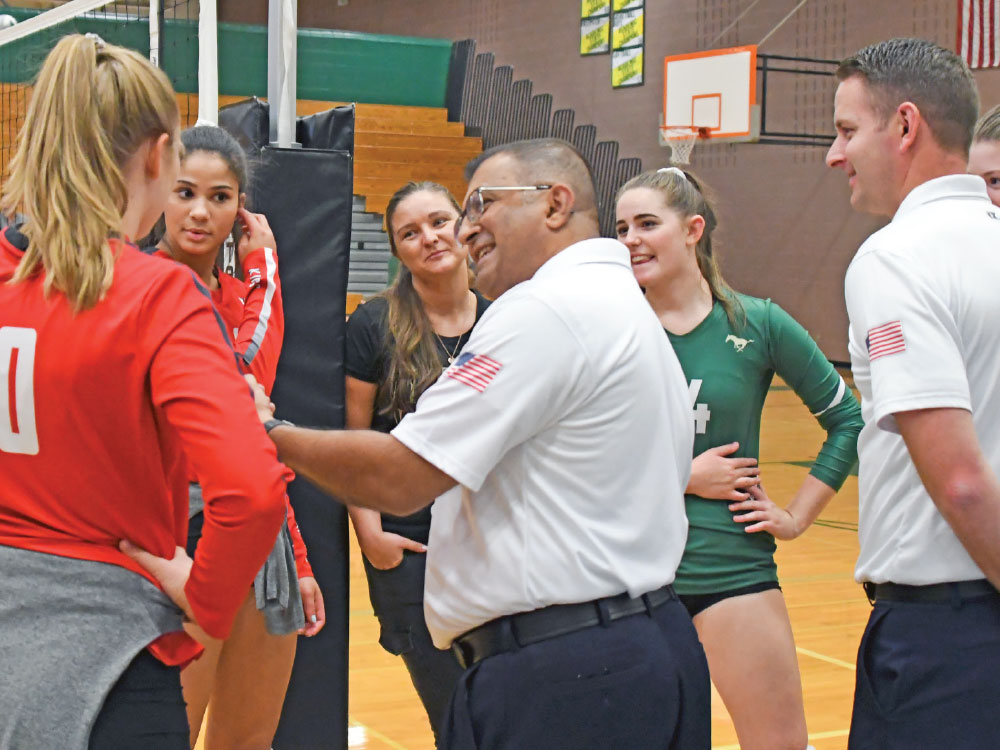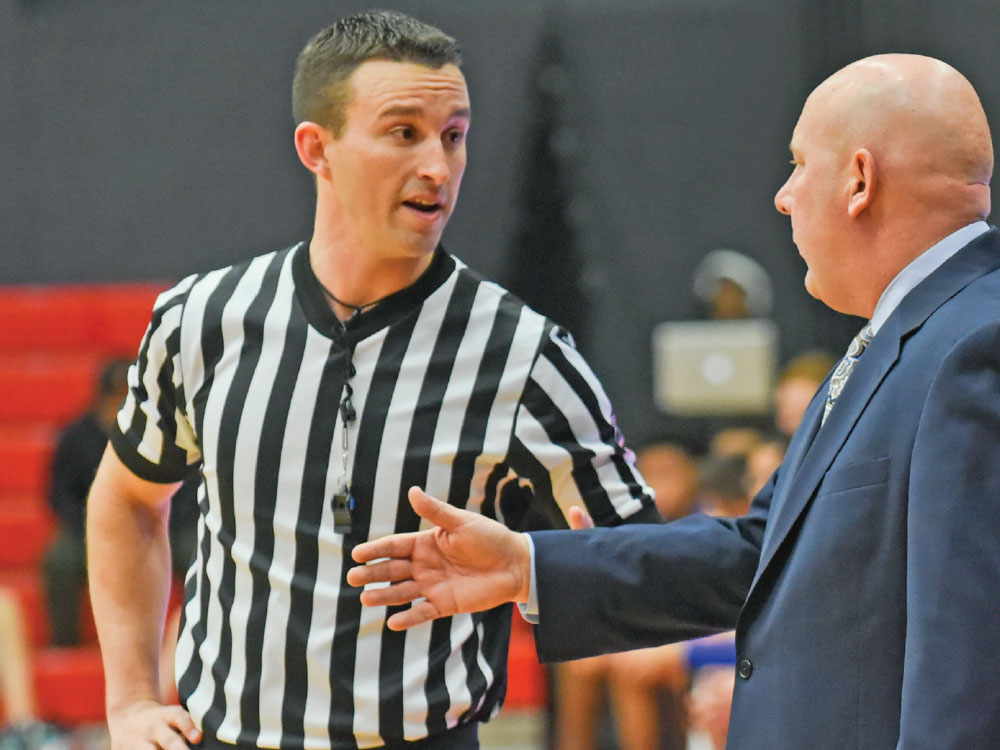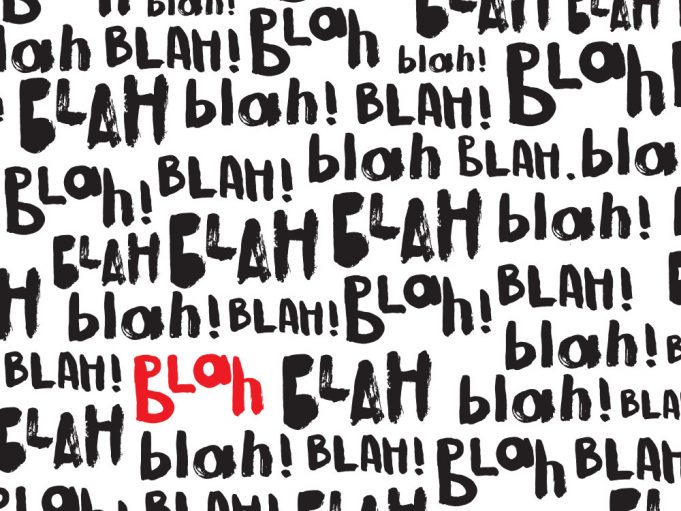When it comes to the necessities needed in becoming a successful sports official, the art of conversation might not seem to be high on the list.
However, talking with league and association hierarchy, and conversing with the game participants, particularly the coaches, is a skill that every good official must employ when needed.
Conversations vary depending on the situations and the coaches. The ability to assess the situation correctly is part of the art.
It may be as simple as a coach asking for a clarification of a call or as intense as a coach verbally assaulting a referee when a coach believes his or her team has been wronged. In any case, the ability to understand the situation and find the right words to control it is vital.
Know the Situation
“Having that conversation can de-escalate a situation,” said Marcia Alterman, volleyball officials coordinator for six NCAA Division I conferences. “That conversation can either put out a fire or inflame a fire. A lot of that is body language and voice tone, finding the words that you pick that can help build a relationship of respect.”
It should never be coach versus official.
“The message we’re trying to give is one where there’s no adversarial relationship with a coach, Alterman said. “I’m not your adversary. I may have made a call you didn’t like but I’m just giving you the reason why that call needed to be made.
“If you can do that in a non-confrontational way that can make sense to them, the majority of coaches are going to accept that explanation a lot better.”
Heated discussions with officials can serve multiple purposes in the mind of a coach. It can fire up a team but it can also incite the crowd. It’s a slippery slope.
Officials sometimes have to use their words to defuse the bomb a coach may be ready to detonate.
“No doubt about it,” Lisa Jones, a 19-year veteran NCAA Division I women’s basketball referee, said. “That’s if you’re smart enough to see it while the fuse is still lit and not wait too long before it explodes.

“We have to be able to engage in a critical moment, oftentimes with not a lot of information, not a lot of time, and not a lot of words. That’s why body language, eye-to-eye contact, choosing your words, tone … all of those matter in critical moments.”
It’s incumbent that officials stay cool during these heated circumstances.
“If you’re coaching a game and you’re yelling at me, or your behavior is off the charts, I’m not going to deal with answering that question,” said June Courteau, the recently retired NCAA national coordinator of women’s basketball officiating. “I’m going to deal with the behavior first. This is what officials have to learn. If I answer the question when you are out of control, I am just rewarding your behavior. I think that is an important piece.
“Communication is respect for each other. You have to get the behavior under control first in order for it to happen.”
Don’t React; Just Respond
The old adage “speak only when spoken to” holds true for officials.
“You don’t have to answer every statement,” Courteau, a 2016 inductee into the Women’s Basketball Hall of Fame, said. “Sometimes it’s just a statement and you don’t have to turn around and answer that. You’ll know when it needs to be answered. Just be professional, be respectful and listen.”
“Our job as officials is to communicate with the coaches but our response should be a response, not a reaction to the coach,” said J.D. Collins, NCAA national coordinator of men’s basketball officiating. “When we’re reacting, our body language shows the passion and emotion. But when we’re ‘responding,’ we’re simply addressing a yes/no or agree/disagree question. Just saying, ‘I hear you, I’m listening’ could mean a lot. That’s because oftentimes a coach just wants to know, ‘Are you hearing me? Are you listening to me?’”
Be Authentic
Monty McCutchen, NBA vice president of referee development and training, said the league has standards to which it wants its officials to adhere.
“I want our officials to be authentic. When it comes to conversations with coaches, I don’t want canned answers. I don’t want dictums, such as five words or less or any of that,” McCutchen remarked. “I don’t think that it works. What it does is put the people in the position of playing the role of official instead of just being an official who’s authentic.”
It may be as simple as demonstrating to a coach that you’re human.
“My mission is to be fair, competent and ultimately believable and open to coaches so they are comfortable communicating with me,” said Jones, who officiated her 10th NCAA Women’s Final Four in April. “I like to be a human being. I want them to see me as human. If they see me as robotic or too businesslike out there, it’s really easy for them to get upset and start yelling and screaming. I’m going to make errors but I’m going to do my darnedest not to make any. I think people forgive people who they see as human. I need to demonstrate that prior to any critical moment.”
Coaches want officials to be approachable.
“By saying to a coach, ‘What are you seeing?’ or ‘What have I done?’ it’s a backdoor compliment,” Courteau said. “I just said to the coach you know something more than I do indirectly. ‘What are you seeing that I’m not seeing, coach? I’m open to what you have to say.’”
Coaching Motives
Officials have a difficult job determining if a coach has a motive when it comes to conversation. Are they trying to gain influence? Or are they just being friendly?
An official must find a balance. He or she must be receptive to conversations but only on a professional level, not a personal one.
“There’s no question that coaches are trying to influence the officials and there’s no question that they want more explanations of calls,” Collins said. “But we should not be responding to a coach on every whistle. The calls stand for themselves … they are what they are.”

In the NBA, McCutchen said, “We don’t want dissertations or politicking as a form of our communication. What we want is to describe the reason we made our choice. How we came to our decision through the rulebook while being open to the opposite view by a coach or a player.”
McCutchen is not naïve. He knows the coach may have an ulterior motive.
“People who are trying to win the game at the highest levels are constantly looking for an edge,” he remarked. “One of the things that makes a good official is being able to interact with that fundamental desire to win while upholding the game’s standards, and not allow the standing of an individual to override those standards.
“Trying to influence you isn’t necessarily a negative thing. That’s what they do. They advocate for their team. And that’s the role of a coach. You just have to recognize that their role and your role are separate and can coexist well.”
In any discussion with a coach, McCutchen has a simple mantra: “Listen first; talk second.”
A Cyclical Trend
Most of the basketball officials interviewed for this story said there hasn’t been a dramatic increase in the number of coach/official conversations over the last few years.
“I think it’s cyclical. It goes up and down as the years pass,” Collins said. “There are certain things we can do and that we’ve tried to do to minimize the number of conversations. We certainly need to be available to the coaches to do the best we can to communicate with them. At the same time, every play does not deserve an explanation.”
Three seasons ago the NCAA instituted a change for its officials. After a two- or three-shot foul is called, the official who would stand in front of the team bench has been moved. Instead of being on the sideline for the first free throw, the official moves to the center circle to provide space so that there aren’t as many unnecessary conversations. On the last free throw of multiple foul shots, the official moves from center court down to the 28-foot hash mark so he or she can referee the play.
“There are little things like that we’ve done that try to minimize the number of conversations and yet one of the jobs of the officials is to communicate well with the coaches,” Collins noted. “It’s a balancing act, quite frankly.”
Volleyball Differs
One sport where discussions with coaches have increased is collegiate volleyball.
Alterman, who officiated for 36 years, said, “It grew slowly through the years and then somebody stepped on the gas three years ago when we introduced video replay into the sport.”
The advent of video replay, what the NCAA calls CRS (Challenge Review System), has created a huge landslide of communication challenges for volleyball officials.
“The coaches don’t know those rules very well because they are so new to everybody,” Alterman noted. “They often want to discuss the whys and wherefores. How come that rule exists? How come I can’t challenge?”
Actions Speak Louder
Being a good communicator is important but it’s only part of an official’s job.
In order to get the respect of coaches and players, officials must excel at all aspects of officiating.
“I think the first thing is the official has to get comfortable with the sideline,” Collins said. “Many times at the beginning of an official’s career they won’t even look over at the bench area because something bad might be happening over there. So if I don’t see it I don’t have to deal with it.
“The officials have to get comfortable with seeing the bench area, seeing all the players, seeing the water bottles, seeing the coach. So when there is a situation that needs to be addressed, they’re not uncomfortable looking there and going there to address it.”
Courteau said as an official you first need to work on the basic fundamentals. You need to work on positioning, know the rules and know the mechanics.
“Because if you do all those things consistently night after night and your call accuracy is high because you’re in the right place and you’re looking at the right players and you know your rules, you’re not going to have to do a lot of communication, are you?
“That’s because your communication is done by your work.”
What's Your Call? Leave a Comment:
Note: This article is archival in nature. Rules, interpretations, mechanics, philosophies and other information may or may not be correct for the current year.
This article is the copyright of ©Referee Enterprises, Inc., and may not be republished in whole or in part online, in print or in any capacity without expressed written permission from Referee. The article is made available for educational use by individuals.



















